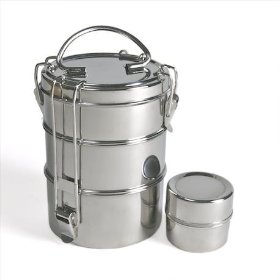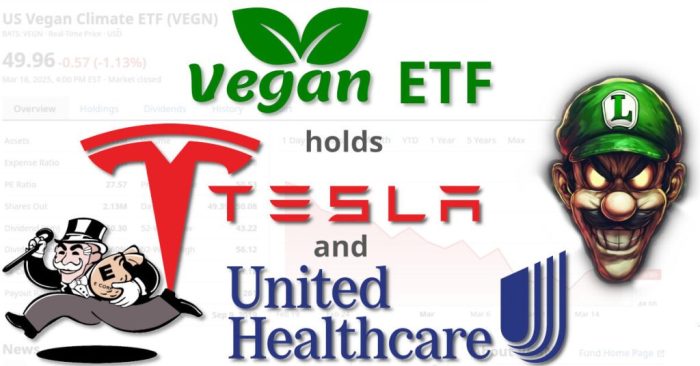Vegan ETF Scam
Beyond Investing’s US Vegan Climate ETF (VEGN) is *not* an ethical option. Do not give them your money.
Update 2025-03-24: Since I contacted Beyond Investing asking them to divest from Tesla and United Health, their holdings of Tesla increased from 3.29% to 3.85%
Update 2025-03-24: After publishing, I got a response from Debra Bouton stating “We are actively monitoring the situation and will make a decision at our next rebalance, in June 2025”. Please contact them to let them know that waiting 3 months to begin discussing how to respond to popular protest’s demands to divest from unethical companies is not acceptable.
Ethical investing. Is it possible?

An unelected plutocrat gives a nazi salute on 2025-01-20
I got my first job with company-matching 401(k) as a teenager. The advice on “personal finance” forums were clear:
- max-out your yearly (Roth) IRA and 401(k) matches every year,
- throw it all into some vanguard/fidelity/evil-corp’s managed hedge/index/etf-fund, and
- just forget about it for 30 years until you retire.
What these “personal finance” forums don’t tell you is that they’re profiting from murdering babies.
At some point I realized these companies had taken my retirement money and used it to fund companies profiting off of fossil fuel extraction or factory farms causing the climate catastrophe, weapons used to commit war crimes, pharmaceutical companies profiting off of opiate addiction, and tech companies whose negligence lead to genocide.
So I sold-off all my evil-corp-controlled retirement funds and tried to reinvest them into various SRIs (Socially Responsible Investing). One of the investments that quickly popped-up on my radar was Beyond Investing’s US Vegan Climate ETF (VEGN).
US Vegan Climate ETF (VEGN)
Unfortunately, VEGN is not a Socially Responsible Investment.
 March 24, 2025
·
March 24, 2025
·  Michael ·
Michael ·  No Comments
No Comments
 Tags: capitalism, claire smith, debra bouton, donald trump, elon musk, etf, health, larry abele, lee coates, sri, tesla, TeslaTakedown, united health, united states, us vegan climate etf, vegan, vegn · Posted in: Uncategorized
Tags: capitalism, claire smith, debra bouton, donald trump, elon musk, etf, health, larry abele, lee coates, sri, tesla, TeslaTakedown, united health, united states, us vegan climate etf, vegan, vegn · Posted in: Uncategorized
Vegan Complete Protein Ratios
One of the most ubiquitous combinations of food found in indigenous cultures around the world is rice and beans. Rice (high in lysine) and beans (high in methionine) provide the body with all the essential amino acids necessary to build protein that would otherwise be lacking from a vegan diet. For a great cheat-sheet listing vegetarian foods that provide the highest concentrations of lysine and methionine amino acids per 100g serving, checkout my post on The Methionine and Lysine Complete Protein Cheat Sheet.
But this begs the question: how much rice do I combine with how much beans to achieve a complete protein without wasting any amino acids? 1 cup rice with 1 cup beans? Or more on the beans? Or more on the rice? What about hummus? Should I have equal parts of tahini and garbanzo to achieve that perfect lysine/methionine ratio for a complete protein?
In this post I will investigate these questions. I’ll provide links to the sources I used for nutritional information, and show my calculations to determine what volume of lysine-rich food A should be combined with what volume of methionine-rich food B to achieve that golden ratio to form a complete protein.
 October 20, 2014
·
October 20, 2014
·  Michael ·
Michael ·  2 Comments
2 Comments
 Tags: amino acid, bean, complete protein, cystine, lysine, methionine, protein, rice, seed, sesame, tahini · Posted in: diet, health, vegan, vegetarian
Tags: amino acid, bean, complete protein, cystine, lysine, methionine, protein, rice, seed, sesame, tahini · Posted in: diet, health, vegan, vegetarian
Grocery Shopping in Orlando – A guide to buying healthy, mostly organic foods (on a student budget!)
I’ve lived in Orlando for 4 years as a college student. I try to keep my grocery bill under $200 per month, and I try to eat mostly organics; this guide will show you how I do this.
 October 20, 2014
·
October 20, 2014
·  Michael ·
Michael ·  No Comments
No Comments
 Tags: cheap, diet, local, organic, student, vegan · Posted in: cooporatives, diet, for profits, health, nonprofits, organic, organizations, vegan, vegetarian
Tags: cheap, diet, local, organic, student, vegan · Posted in: cooporatives, diet, for profits, health, nonprofits, organic, organizations, vegan, vegetarian
CFE FCU denies cyclists to utilize drive-thru services
Today I was denied access to make a deposit at the Central Florida Educators Federal Credit Union drive-thru because I was on a bicycle. I expect better from a local, member-owned cooperative.
If you are a member of CFE and you want to see this policy changed, send me an email at michael .dot. sa _at_ gmail *dot* com. Hopefully we, as members, can change this policy so that CFE supports bicycles as a mode of transportation.
Here is the formal letter I am sending to CFE (or see the PDF of this letter):
Dear CFE FCU,
I am writing today to bring to light my dissatisfaction with CFE’s drive-thru policy, which denies cyclists from utilizing drive-thru services.
On Saturday, December 31st, I rode my bicycle to CFE’s drive-thru (the CFE lobby is closed on Saturdays; only the drive-thru is open). When I submitted my request to make a deposit, I was apologetically refused service on the grounds that I was not on a motorized vehicle and that I was therefore violating a stipulation in the CFE insurance policy.
I expect better from a local, member-owned cooperative.
Bicycles are a realistic and extraordinarily efficient mode of transportation. In fact, the human being on a bicycle is the most efficient self-powered means of transportation–more efficient than a condor in flight.[1] With a loss of less than 2% of energy[2], bicycles are far more efficient than automobiles (which lose ~80% of energy[3]). Bicycle travel emits no greenhouse gasses, eliminates our dependence on oil, is cheap, and provides a healthy exercise. As an avid cyclist who rode ~8,000 miles in the past 2 years, I can certainly attest first-hand to the incredible innovation of this non-motorized machine.
The logic behind the insurance restricting drive-thru access to motorized vehicles is faulty. I have utilized the CFE drive-thru numerous times on my motorcycle without issue. A motorcycle rider is no less vulnerable to injury than a bicycle rider. Moreover, In the eyes of FL traffic law: bicycles, motorcycles, and automobiles are all vehicles with essentially the same rights & responsibilities on public roads. Why should there be a difference in a drive-thru?
As a member of LGE Community CU, I am a member of the CU Service Center Network; I am not a member of CFE FCU. However, as a member of the Orlando community, I am writing this letter to the CFE Board of Directors and CFE members suggesting that they introduce 2 proposals:
1. I propose that CFE changes their insurance policy (or if need be, their insurance provider) to one that allows non-motorized vehicles to utilize drive-thru services.
2. I propose that CFE shows their support for bicycles as an alternative mode of transportation by pledging to donate $1 to a local, non-profit bicycle cooperative for every member who rides a non-motorized vehicle to CFE and makes a transaction. Examples of local bicycle organizations include: Orlando Road Club and UCF Spokescouncil.
Sincerely,
______________
Michael Altfield[1] “Bicycle Technology”, S.S. Wilson, Scientific American, March 1973
[2] www.jhu.edu/~gazette/1999/aug3099/30pedal.html
[3] mb-soft.com/public2/engine.html
 December 31, 2011
·
December 31, 2011
·  Michael ·
Michael ·  2 Comments
2 Comments
 Tags: cfe, cooporatives, credit unions, cycling, drivethru, efficiency, health · Posted in: bicycle, car, cooporatives, motorcycle, nonprofits, organizations, transportation
Tags: cfe, cooporatives, credit unions, cycling, drivethru, efficiency, health · Posted in: bicycle, car, cooporatives, motorcycle, nonprofits, organizations, transportation
Homegrown, Sustainable Wheat
I’ve biked past the wheat fields of Kansas/Colorado. I saw the seemingly endless fields of annual corn + wheat GMOs.
The centralized food industry of the United States has evolved far beyond traditional farming. Today, our farming techniques are very good at producing mass quantities of drought-resistant, disease-resistant, and (*gasp*) herbicide-resistant crops. However, our feeble attempts at genetic manipulation and industrialization of our food supply has neglected a number of extremely important variables: nutrition, toxicity, and sustainability.
When selecting a single species of wheat on which to focus our centralized, mass production, we select it primarily for its ability to yield and tolerate chemical treatments. There are only inconclusive studies regarding the potential long-term health effects from consuming Roundup treated GMOs.
Most importantly, the entire system is absolutely unsustainable.
Besides being heavily dependent on fossil fuels, most wheat is an annual crop. The nutritionless soil needs to be tilled, and new seeds must be planted. Perennials, on the other hand, don’t need to be replanted each season. Perennials typically have more standing biomass than annuals; the roots are generally far deeper–which means better erosion control and less long-term irrigation & fertilization. Perennials also produce slightly less yield than annuals, which is why they’re generally neglected by the industry whose bottom line is profit–not nutrition or logically sound, well-designed, sustainable farming practices.
Decentralization for a Sustainable & Secure Future
With the decreasing availability (increasing costs) of fossil fuels and the diminishing supply of fresh water on Earth due to climate change, the option to make unsustainable shortcuts in our food production is quickly fleeting. The solution? Decentralization & organic practices.
In 1970, 90% of the US labor force was dedicated to agriculture. Today it’s 2.6%. Talk about centralization! We need to support local farms. We need to grow our own food. We need to become independent.
Personally, I’m converting my suburban weedy backyard into an organic garden. I’ve been educating myself about permaculture, which focuses on no-maintenance, self-sustaining, long-term gardening techniques that work *with* nature instead of trying to get short-lived, highly productive & unnatural yields. Obviously, my small-scale yields will only minimally impact my dependence on the food industry. However, if we converted every purely-aesthetic lawn in America to a fully functional mini Edible Forest Garden, we will no doubt make a huge impact on our dependence on the currently unsustainable agriculture industry.
In addition to various perennial vegetables I’m planting, I decided to venture out and search for a sustainable wheat variety. Of course, I want a perennial wheat.
Enter Perennial Wheat
Unfortunately, perennial wheat seed isn’t exactly in stock at your typical organic seed store. It’s currently under research funded by US tax dollars–which claims perennial wheat is a solution to our failing agriculture industry. (surprise surprise)
I ran across an article outlining a few lesser known (perennial) grains, and decided to plant _Thinopyrum intermedium_ or Wild Triga. Almost hopeless, I gave a call to the Den Besten Seed Company (605-337-3318). They said they usually carry Wild Triga seed @ ~$3/lb, but are currently out of stock. I’m planning on calling them back around September for next season. Can’t wait!
Other sources:
https://www.agclassroom.org/gan/timeline/farmers_land.htm
 March 10, 2011
·
March 10, 2011
·  Michael ·
Michael ·  No Comments
No Comments
 Tags: agriculture, capitalism, erosion, gardening, GMOs, grains, grass, health, nutrition, peak oil, perennials, permaculture, roundup, sustainibility, toxins, wheat · Posted in: agriculture, climate, diet, health
Tags: agriculture, capitalism, erosion, gardening, GMOs, grains, grass, health, nutrition, peak oil, perennials, permaculture, roundup, sustainibility, toxins, wheat · Posted in: agriculture, climate, diet, health
Reduce throw-away lunches

3-Tier Tiffin
I bought my tiffin for $25 + free shipping from Gaiam on eBay. Gaiam sells some products that are pretty ridiculous, but the To-Go Ware tiffin is definitely a fantastic item; I use it every day instead of cheap, throw-away, environmentally-unfriendly plastic! Even if you (admirably) refuse to buy/use plastic bags, the alternative (aluminum foil or wax paper) is highly unlikely to be recycled. Sadly, this is normally the case when finite resources (aluminum) get soiled by food (mustard, vegenaise, etc).
IMHO, the most sustainable lunch practice is to buy something that’s easily cleanable, reusable everyday, will last forever, and is completely recyclable in the event that it breaks. The To-Go Ware tiffin matches these requirements.
 March 10, 2011
·
March 10, 2011
·  Michael ·
Michael ·  No Comments
No Comments
 Tags: india, recycle, reduce, reuse, steel, tiffin, waste · Posted in: recycle, reduce, reuse, waste
Tags: india, recycle, reduce, reuse, steel, tiffin, waste · Posted in: recycle, reduce, reuse, waste
The Methionine + Lysine Complete Protein Cheat Sheet
Being a self-educated vegan, it’s easy to muck things up–especially when it comes to eating the right protein when the FDA doesn’t require foods to be labeled with their amino acid contents. The mere grams of protein in a meal is insufficient information to determine how much protein your body can actually absorb.
I recently ran across the concept of a complete protein on wikipedia. One of the limiting factors of the adult body being able to turn amino acids into protein depend on the ratio of 7 different amino acids. If any one of these proteins is too low, it becomes the limiting amino acid / bottleneck on your body being able to build protein. These amino acids and their proportions necessary to form a complete protein are listed below (copied from wikipedia):
 February 12, 2011
·
February 12, 2011
·  Michael ·
Michael ·  4 Comments
4 Comments
 Tags: amino acids, beans, health, lysine, methionine, protein, rice, vegan, vegetarian · Posted in: diet, health, vegan, vegetarian
Tags: amino acids, beans, health, lysine, methionine, protein, rice, vegan, vegetarian · Posted in: diet, health, vegan, vegetarian
Cheap Vegan Protein Shakes
The more I learned about the meat industry in America, the more I learned how impossible it was to maintain a low carbon foot print and live a sustainable lifestyle while still supporting the meat industry. Organic meats are few and far between, expensive, and still less efficient than eating plants directly. So, several months ago, I cut it out of the equation and became vegetarian. More recently, I pushed the envelope a bit farther and became vegan.
Going vegetarian isn’t too tough (that said, do dietary research first! I know people who’ve wound up in the ER for not eating correctly once turning vegetarian). On the other hand, going vegan *is* _pretty_ tough. While many meat-eaters out there might still be amazed at how many vegan meals & snacks they’re already enjoying on a daily basis, I’m amazed at how many things have milk in them (there isn’t a single bag of croutons or bread crumbs at my local grocery store that doesn’t contain milk). There’s also a lot of long-lasting items that I’ve had to slowly finish off before my diet could finally be 100% vegan. For me, such things included: butter, a big pack of bouillon cubes, bread crumbs, and a 5lb tub of Whey Protein powder. Well, I finally finished off the last of my protein powder, so it’s time to buy a more sustainable alternative to Whey.
I’m a vegetarian in college. I need my protein, but I can’t afford to hit up GNC for a $50 trial-size mini bottle of vegan protein powder. Previously, I’d get a 5lb tub of Body Fortress Whey Protein from Walmart for ~$35. I was amazed when I found out that I could get 5lb of vegan protein shipped to my door for the same price!
The answer for cheap vegan protein by the pound is truenutrition.com. On top of the fact that it’s vegan _and_ super cheap, it also allows you to customize your powder with different %s of different proteins, carbs, fats, and supplements. Be careful when adding supplements to your mix though–some of them are synthetically derived from ambiguous sources (such as animals). Because of this, I just got 100% straight pea protein. I’m probably better off for it; the less chemicals the better, right? As for the carbs, I just throw a banana in with the protein shake.

truenutrition.com
 March 9, 2010
·
March 9, 2010
·  Michael ·
Michael ·  No Comments
No Comments
 Tags: body fortress, cheap, gnc, hemp, pea, protein, protein shake, rice, soy, truenutrition.com, trueprotein.com, vegan, walmart · Posted in: diet, vegan, vegetarian
Tags: body fortress, cheap, gnc, hemp, pea, protein, protein shake, rice, soy, truenutrition.com, trueprotein.com, vegan, walmart · Posted in: diet, vegan, vegetarian
Antioxident-Rich Plants, for real
Not long after I began dissecting and altering my lifestyle to become more sustainable, I realized the benefits of supporting local farms. What’s better than buying produce from local farms? Growing yourself. As I had just bought a house, I made it my goal to convert the overgrown weedy backyard into an organic garden.
While my backyard garden is still a work-in-progress, I _have_ put some thought into _what_ to grow. I’m certainly no dietitian, but I figured–health wise–I should grow something with antioxidants.
 January 27, 2010
·
January 27, 2010
·  Michael ·
Michael ·  5 Comments
5 Comments
 Tags: acai, antioxidant, capitalism, dog rose, food, health, rosa canina, rose, rose hips · Posted in: diet, health
Tags: acai, antioxidant, capitalism, dog rose, food, health, rosa canina, rose, rose hips · Posted in: diet, health
Cross-country Bicycle Trip
It’s been a couple of weeks since Quinn and I created a website specifically for our cross-country bicycle trip (Georgia to California) that we’re embarking on this summer (2010), but I haven’t really advertised it, yet. Then again, I haven’t really advertised *this* site at all. Nevertheless, the website is: https://1guy2biketrips.michaelaltfield.net.
If 2 guys can trek >3,000 miles on a bicycle, it aint too tough to travel 10 miles to work every morning on a bicycle! Cut the traffic, reduce your CO2 emissions, and live a healthier lifestyle. Ride a bicycle to work!
 December 23, 2009
·
December 23, 2009
·  Michael ·
Michael ·  2 Comments
2 Comments
 Tags: 2guys1biketrip, co2, cycling, health · Posted in: active, bicycle, climate, co2, health, transportation
Tags: 2guys1biketrip, co2, cycling, health · Posted in: active, bicycle, climate, co2, health, transportation



Thank you for going to the trouble of doing the calculations and sharing the info. Do you have a list…